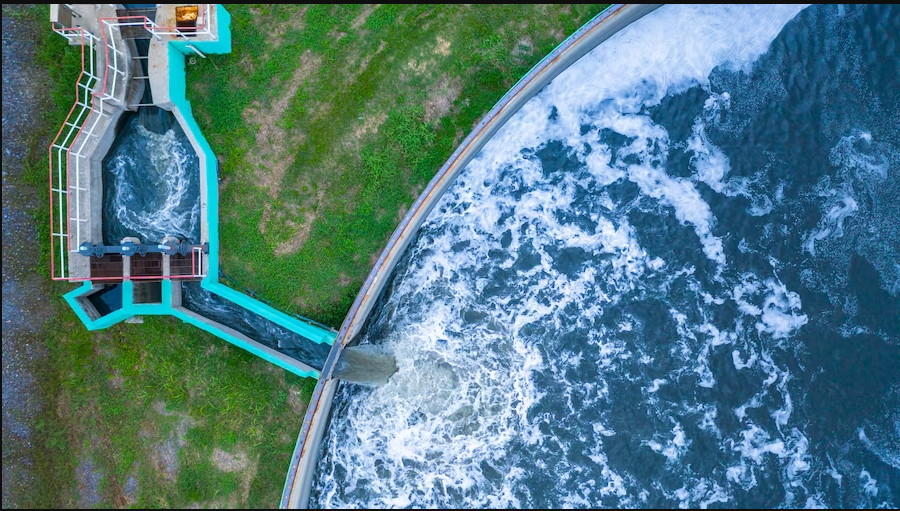Water scarcity is a pressing issue that affects millions of people in India and around the world. As the population continues to grow and industrialization expands, the demand for freshwater resources has surged. In such a scenario, wastewater treatment plants play a pivotal role in addressing this crisis.
This article explores the multifaceted importance of wastewater treatment in solving water scarcity and how homeowners and businesses can benefit from it.

Understanding Water Scarcity in India
India, a land of vast geographical and cultural diversity, also bears the stark contrast of regions blessed with abundant water resources alongside those grappling with severe water scarcity. The problem of water scarcity is further exacerbated by a combination of factors, including climate change, inefficient water management practices, and the relentless depletion of groundwater reserves. As a result, millions of people face daily challenges in accessing clean and safe drinking water.
Water scarcity has far-reaching consequences that extend beyond the simple shortage of drinking water. It affects agriculture, industries, and the environment, leading to widespread implications for the economy and public health. To mitigate this multifaceted crisis, innovative solutions are required, and one of the most effective approaches is wastewater treatment.
The Role of Wastewater Treatment Plants
Wastewater treatment plants, often hidden from the public eye, are unsung heroes in the realm of water resource management. They perform a wide array of functions to ensure that the water we use in our homes and industries is purified and safe to return to the environment. Here’s a comprehensive look at how these plants contribute to solving water scarcity:
Resource Recovery
Wastewater treatment plants are not just waste disposal sites. They are resource recovery hubs. Through advanced treatment processes, these facilities can extract valuable resources from wastewater. For instance, phosphorus and nitrogen, essential nutrients for agriculture, can be recovered from wastewater. Additionally, some advanced treatment facilities have the capability to generate biogas from the organic waste present in wastewater, contributing to the production of clean, renewable energy.
Reducing Pollution
Untreated wastewater contains a wide array of pollutants, including harmful chemicals and disease-causing pathogens. When discharged into rivers and lakes, this untreated wastewater can contaminate water sources and disrupt delicate aquatic ecosystems. Wastewater treatment plants are instrumental in removing these contaminants, ensuring that the water released back into the environment meets stringent safety standards.
Conserving Freshwater Resources
Treating and reusing wastewater for non-potable purposes like irrigation and industrial processes significantly reduces the demand for freshwater sources. This is of paramount importance in regions facing acute water scarcity, as it not only conserves water but also helps maintain ecological balance.
Protecting Public Health
Inadequate wastewater treatment poses a severe threat to public health. It can lead to the rapid spread of waterborne diseases, endangering the well-being of communities. Proper wastewater treatment is instrumental in ensuring that the water supply remains free from harmful pathogens, thereby safeguarding public health.
Sustainable Development
Wastewater treatment is closely aligned with the principles of sustainable development. It promotes responsible water management, reduces the strain on natural water sources, and supports long-term environmental sustainability. Furthermore, it can enhance the quality of life for communities by providing a continuous supply of safe water.
The Role of Wastewater Treatment Companies
While wastewater treatment plants are integral to the process, wastewater treatment companies are the driving force behind the design, construction, operation, and maintenance of these facilities. These companies provide essential services to both homeowners and businesses, ensuring that wastewater is effectively treated and managed. Here’s a detailed examination of how these companies contribute to solving water scarcity:
Customised Solutions
Wastewater treatment companies understand that one size does not fit all. They offer customised solutions tailored to the specific needs of their clients. For homeowners, this might involve installing small-scale wastewater treatment systems that suit the property’s size and requirements. On the other hand, businesses may require more complex and larger treatment plants designed to meet industrial wastewater standards. These solutions are meticulously designed to maximise efficiency and minimise environmental impact.
Expertise and Knowledge
Wastewater treatment companies employ experts in the field who possess a deep understanding of wastewater treatment processes, regulations, and technologies. This expertise is crucial in ensuring that wastewater is treated efficiently and in strict compliance with environmental standards.
Efficient Operation and Maintenance
Proper operation and maintenance of wastewater treatment facilities are pivotal to their effectiveness. The companies take on the responsibility of ensuring that these plants run smoothly, preventing downtime and disruptions in service. This proactive approach ensures that the treatment process is consistent and reliable.
Environmental Compliance
Environmental regulations pertaining to wastewater discharge are stringent and continually evolving. Non-compliance can result in legal and financial consequences. Wastewater treatment companies stay up-to-date with these regulations and ensure that their clients’ facilities meet all necessary requirements. This proactive approach not only protects the environment but also safeguards clients from potential liabilities.
Innovation and Technology
The field of wastewater treatment is in a constant state of evolution, with new technologies and approaches emerging regularly. The manufacturing companies invest in research and development to implement innovative solutions that improve efficiency, reduce environmental impact, and enhance overall performance. These innovations contribute to the sustainability of water treatment processes.
Wastewater Treatment Solutions for Homeowners
For homeowners, the availability of clean and safe water for domestic use is of paramount importance. Wastewater treatment solutions designed for residential properties can help address this concern. Here are some options available to homeowners:
Septic Systems
Many homes in rural areas rely on septic systems to treat wastewater. These systems are designed to separate solids from liquids and allow the effluent to percolate into the soil. Proper maintenance, including regular pumping, is essential to ensure their effectiveness and longevity.
Aerobic Treatment Units (ATUs)
ATUs use oxygen to break down and treat wastewater. They are more efficient than conventional septic systems and are suitable for areas with poor soil conditions. These systems are designed to provide higher treatment quality, making them a suitable option for areas where groundwater protection is a priority.
Constructed Wetlands
Some environmentally conscious homeowners opt for natural wastewater treatment solutions like constructed wetlands. These systems use wetland plants and beneficial microorganisms to filter and treat wastewater, making them environmentally friendly and low-maintenance options. Constructed wetlands also provide a habitat for wildlife and enhance the aesthetics of the property.
Advanced Onsite Systems
Advanced onsite wastewater treatment systems incorporate cutting-edge technologies such as membrane bioreactors (MBRs) and sequential batch reactors (SBRs) to treat wastewater to a high standard. These compact systems are ideal for smaller properties and areas where space is limited. They offer superior treatment performance and are capable of removing a wide range of contaminants.
Greywater Recycling
Greywater, which includes water from showers, sinks, and laundry, can be treated and reused for non-potable purposes like irrigation and toilet flushing. Greywater recycling systems are becoming increasingly popular among environmentally conscious homeowners. They reduce the demand for freshwater for non-drinking purposes, making efficient use of available resources.
Wastewater Treatment Solutions for Businesses
Businesses, especially industries, have a significant impact on water resources due to their higher water consumption and the potential for industrial wastewater contamination. Wastewater treatment companies offer a range of solutions for businesses to manage their wastewater effectively. Here are some solutions:
Industrial Wastewater Treatment Plants
Industries often generate complex wastewater with various contaminants, including heavy metals, organic compounds, and chemicals. Specialised industrial wastewater treatment plants are designed to handle these challenges, ensuring compliance with stringent environmental regulations. These plants employ a range of processes, including chemical treatment, filtration, and biological treatment, to remove pollutants and produce effluent that meets regulatory standards.
Zero Liquid Discharge (ZLD) Systems
Zero Liquid Discharge (ZLD) systems represent the pinnacle of sustainability in wastewater management. These systems aim to minimise wastewater discharge by recovering and reusing nearly all the wastewater generated in industrial processes. ZLD systems employ a combination of advanced treatment processes, including evaporation and crystallisation, to produce a minimal amount of concentrated brine and a high-quality distillate that can be reused or safely discharged. ZLD conserves water resources, minimises environmental impact, and reduces disposal costs.
Effluent Treatment Plants (ETPs)
Effluent Treatment Plants (ETPs) are commonly used to treat effluent from various industries, including textiles, chemicals, and food processing. These plants are tailored to address the specific contaminants present in the industrial effluent. They employ a range of treatment processes, such as chemical coagulation, sedimentation, and biological treatment, to remove pollutants and produce treated water that complies with environmental regulations. ETPs play a crucial role in preventing industrial effluent from polluting natural water bodies.
Recycling and Reuse Systems
Many businesses can benefit from recycling and reusing their treated wastewater for processes that do not require potable water quality. Wastewater treatment companies can design and implement systems that treat wastewater to a suitable standard for reuse. This approach conserves water resources and reduces operational costs, making it an attractive option for businesses seeking sustainable solutions.
Ongoing Monitoring and Maintenance
Proper operation and maintenance of wastewater treatment facilities are essential for their long-term performance and compliance with environmental regulations. Wastewater treatment companies provide businesses with continuous monitoring and maintenance services to ensure that their treatment facilities operate efficiently and reliably. Regular inspections, preventive maintenance, and troubleshooting are key components of these services, ensuring that any issues are promptly addressed.
Choosing the Right Wastewater Treatment Company
Selecting the right wastewater treatment company is paramount for both homeowners and businesses. Here are some important factors to consider when making the decision:
Experience and Expertise
Look for a company with a proven track record in designing, building, and operating wastewater treatment facilities. Experience in your specific industry or residential context is a significant advantage, as it demonstrates a deep understanding of the unique challenges and requirements of your project.
Regulatory Compliance
Ensure that the company is well-versed in local and national environmental regulations. A reputable company should have a strong commitment to meeting these standards and keeping abreast of any changes or updates.
Innovative Solutions
A forward-thinking company will be more likely to offer innovative and sustainable wastewater treatment solutions that can save you money and reduce your environmental footprint. Inquire about their commitment to researching and implementing cutting-edge technologies.
References and Reviews
A reputable wastewater treatment company should be able to provide references from satisfied clients. Additionally, reading reviews and testimonials from previous clients can provide valuable insights into the company’s reliability, professionalism, and quality of service.
Maintenance and Support
Inquire about the company’s post-installation support and maintenance services. Effective operation and maintenance are essential for the long-term success of wastewater treatment systems. A company that offers comprehensive maintenance services can help ensure the continued performance and compliance of your treatment facility.
We Offer Custom Wastewater Treatment Solutions at Great Prices
At Cleantech Water, we believe in making clean water accessible and sustainable for everyone, whether you’re a homeowner or a business owner.
Our team of experts excels in designing wastewater treatment solutions that not only effectively treat wastewater but also fit seamlessly into your budget. We understand that each situation is different, and that’s why we don’t offer one-size-fits-all solutions. Instead, we take the time to assess your requirements, ensuring that the solution we provide is not just efficient but also cost-effective.
Contact us at +91-9558996411 or email us at info@cleantechwater.co.in to learn more about our wastewater treatment plants or to discuss your requirements. We are here to assist you!

